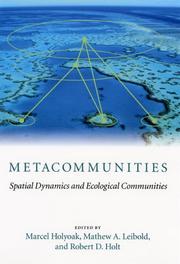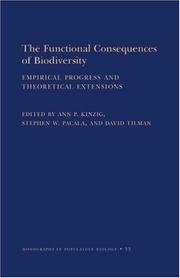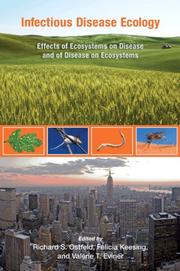| Listing 1 - 10 of 14 | << page >> |
Sort by
|
Article
Abstract | Keywords | Export | Availability | Bookmark
 Loading...
Loading...Choose an application
- Reference Manager
- EndNote
- RefWorks (Direct export to RefWorks)

ISBN: 0226350630 0226350649 9780226350646 Year: 2005 Publisher: Chicago University of Chicago Press
Abstract | Keywords | Export | Availability | Bookmark
 Loading...
Loading...Choose an application
- Reference Manager
- EndNote
- RefWorks (Direct export to RefWorks)
Until recently community ecology& a science devoted to understanding the patterns and processes of species distribution and abundance& focused mainly on specific and often limited scales of a single community. Since the 1970s, for example, metapopulation dynamics& studies of interacting groups of populations connected through movement& concentrated on the processes of population turnover, extinction, and establishment of new populations. 'Metacommunities' takes the hallmarks of metapopulation theory to the next level by considering a group of communities, each of which may contain numerous populations, connected by species interactions within communities and the movement of individuals between communities. In examining communities open to dispersal, the book unites a broad range of ecological theories, presenting some of the first empirical investigations and revealing the value of the metacommunity approach. The collection of empirical, theoretical, and synthetic chapters in 'Metacommunities' seeks to understand how communities work in fragmented landscapes. Encouraging community ecologists to rethink some of the leading theories of population and community dynamics, 'Metacommunities' urges ecologists to expand the spatiotemporal scales of their research.
574 --- General ecology. Biocoenology. Hydrobiology. Biogeography --- Biogeography. --- Biotic communities. --- Population biology. --- Spatial ecology. --- 574 General ecology. Biocoenology. Hydrobiology. Biogeography --- Biogeography --- Biotic communities --- Population biology --- Spatial ecology --- Areography (Biology) --- Geographical distribution of animals and plants --- Species --- Species distribution --- Biology --- Geography --- Ecology --- Biocenoses --- Biocoenoses --- Biogeoecology --- Biological communities --- Biomes --- Biotic community ecology --- Communities, Biotic --- Community ecology, Biotic --- Ecological communities --- Ecosystems --- Natural communities --- Geographical distribution
Book
ISBN: 9780198824282 9780198824299 0198824297 0198824289 Year: 2020 Publisher: Oxford : Oxford University Press,
Abstract | Keywords | Export | Availability | Bookmark
 Loading...
Loading...Choose an application
- Reference Manager
- EndNote
- RefWorks (Direct export to RefWorks)
"Theoretical Ecology : concepts and applications" continues the authoritative and established sequence of theoretical ecology books initiated by Robert M. May which helped pave the way for ecology to become a more robust theoretical science, encouraging the modern biologist to better understand the mathematics behind their theories. This latest instalment builds on the legacy of its predecessors with a completely new set of contributions. Rather than placing emphasis on the historical ideas in theoretical ecology, the Editors have encouraged each contribution to: synthesize historical theoretical ideas within modern frameworks that have emerged in the last 10-20 years (e.g. bridging population interactions to whole food webs); describe novel theory that has emerged in the last 20 years from historical empirical areas (e.g. macro-ecology); and finally to cover the rapidly expanding area of theoretical ecological applications (e.g. disease theory and global change theory). The result is a forward-looking synthesis that will help guide the field through a further decade of discovery and development.It is written for upper level undergraduate students, graduate students, and researchers seeking synthesis and the state of the art in growing areas of interest in theoretical ecology, genetics, evolutionary ecology, and mathematical biology.
Ecology. --- Écologie. --- Écologie.
Book
ISBN: 9780511736551 9781107001831 9780521173131 9781139839891 1139839896 051173655X 1107001838 0521173132 1139853716 1107234026 1139842277 1107254132 1139844636 1139841084 1283943476 Year: 2012 Publisher: Cambridge New York
Abstract | Keywords | Export | Availability | Bookmark
 Loading...
Loading...Choose an application
- Reference Manager
- EndNote
- RefWorks (Direct export to RefWorks)
There is increasing evidence that the structure and functioning of ecological communities and ecosystems are strongly influenced by flexible traits of individuals within species. A deep understanding of how trait flexibility alters direct and indirect species interactions is crucial for addressing key issues in basic and applied ecology. This book provides an integrated perspective on the ecological and evolutionary consequences of interactions mediated by flexible species traits across a wide range of systems. It is the first volume synthesizing the rapidly expanding research field of trait-mediated indirect effects and highlights how the conceptual framework of these effects can aid the understanding of evolutionary processes, population dynamics, community structure and stability, and ecosystem function. It not only brings out the importance of this emerging field for basic ecological questions, but also explores the implications of trait-mediated interactions for the conservation of biodiversity and the response of ecosystems to anthropogenic environmental changes.
Coevolution. --- Adaptation (Biology) --- Biotic communities. --- Biocenoses --- Biocoenoses --- Biogeoecology --- Biological communities --- Biomes --- Biotic community ecology --- Communities, Biotic --- Community ecology, Biotic --- Ecological communities --- Ecosystems --- Natural communities --- Ecology --- Population biology --- Environment --- Biology --- Self-organizing systems --- Variation (Biology) --- Biological fitness --- Genetics --- Co-evolution --- Evolution (Biology) --- Environmental adaptation --- Adaptation, Environmental
Book

ISBN: 9780691199832 9780691199825 Year: 2020 Publisher: Princeton : Princeton University Press,
Abstract | Keywords | Export | Availability | Bookmark
 Loading...
Loading...Choose an application
- Reference Manager
- EndNote
- RefWorks (Direct export to RefWorks)
This volume provides a series of essays on open questions in ecology with the overarching goal being to outline to the most important, most interesting or most fundamental problems in ecology that need to be addressed. The contributions span ecological subfields, from behavioral ecology and population ecology to disease ecology and conservation and range in tone from the technical to more personal meditations on the state of the field. Many of the chapters start or end in moments of genuine curiosity, like one which takes up the question of why the world is green or another which asks what might come of a thought experiment in which we "turn-off" evolution entirely.
Ecology. --- Population biology. --- Coexistence of species. --- Ecosystem management. --- Biodiversity conservation. --- Écologie. --- Biologie des populations. --- Gestion des écosystèmes. --- Biodiversité --- Conservation des ressources. --- POPULATION BIOLOGY --- Biologie des populations --- Écologie. --- Gestion des écosystèmes. --- Biodiversité


ISBN: 9781400847303 9780691088228 Year: 2013 Publisher: Princeton, N.J. Princeton University Press
Abstract | Keywords | Export | Availability | Bookmark
 Loading...
Loading...Choose an application
- Reference Manager
- EndNote
- RefWorks (Direct export to RefWorks)
Digital

ISBN: 9781400831920 9780691136530 Year: 2009 Publisher: Princeton, N.J. Princeton University Press
Abstract | Keywords | Export | Availability | Bookmark
 Loading...
Loading...Choose an application
- Reference Manager
- EndNote
- RefWorks (Direct export to RefWorks)
Book

ISBN: 0691195323 9780691195322 Year: 2020 Publisher: Princeton, NJ
Abstract | Keywords | Export | Availability | Bookmark
 Loading...
Loading...Choose an application
- Reference Manager
- EndNote
- RefWorks (Direct export to RefWorks)
Leading ecologists discuss some of the most compelling open questions in the field todayUnsolved Problems in Ecology brings together many of the world's leading ecologists to discuss the most fundamental research questions confronting the field today. This diverse and thought-provoking collection of essays spans virtually all of the key subfields of the discipline, from behavioral and evolutionary ecology to population biology, community ecology, ecosystem ecology, disease ecology, and conservation biology. These essays are intended to stoke curiosity, challenge prevailing wisdom, and provoke new ways of thinking about ecology in light of new technologies and unprecedented environmental challenges brought on by climate and land-use change. Authoritative and accessible, Unsolved Problems in Ecology is ideal for graduate students in the early stages of their scientific careers and an essential resource for seasoned ecologists looking for exciting new directions to take their research.Sheds light on modern ecology's most important and compelling open questionsFeatures thought-provoking contributions from more than two dozen world-class ecologistsCovers behavior, evolution, communities, ecosystems, resource management, and moreDiscusses ways to raise the financial and intellectual profile of the disciplineAn invaluable resource for graduate students as well as seasoned ecologists
Ecology. --- Population biology. --- Coexistence of species. --- Ecosystem management. --- Biodiversity conservation. --- Biodiversity --- Biological diversity conservation --- Conservation of biodiversity --- Diversity conservation, Biological --- Gender mainstreaming in biodiversity conservation --- Maintenance of biological diversity --- Preservation of biological diversity --- Conservation of natural resources --- Ecosystem management --- Biotic communities --- Ecosystems management --- Applied ecology --- Environmental management --- Nature conservation --- Biodiversity conservation --- Sympatry (Biology) --- Population biology --- Species --- Biology --- Ecology --- Balance of nature --- Bionomics --- Ecological processes --- Ecological science --- Ecological sciences --- Environment --- Environmental biology --- Oecology --- Environmental sciences --- Conservation --- Management --- auto ecology. --- autoecology. --- conservation. --- ecological communities. --- environmental policy. --- environmentalism. --- food web structure. --- food webs. --- growth regulation. --- high dimensional trait space. --- individual-based data. --- interdependence and mutualism. --- intra-genomic variance. --- mating. --- mutation. --- natural resource management. --- population dynamics of complex life cycles. --- population dynamics. --- population size. --- scaling in ecology. --- soil biodiversity. --- species coexistence. --- species richness distribution. --- variance explicit ecology.
Digital

ISBN: 9780691195322 Year: 2020 Publisher: Princeton, N.J. Princeton University Press
Abstract | Keywords | Export | Availability | Bookmark
 Loading...
Loading...Choose an application
- Reference Manager
- EndNote
- RefWorks (Direct export to RefWorks)


ISBN: 128296500X 9786612965005 140083788X 9781400837885 9780691124841 0691124841 9780691124858 069112485X 9781282965003 6612965002 Year: 2010 Publisher: Princeton, NJ
Abstract | Keywords | Export | Availability | Bookmark
 Loading...
Loading...Choose an application
- Reference Manager
- EndNote
- RefWorks (Direct export to RefWorks)
News headlines are forever reporting diseases that take huge tolls on humans, wildlife, domestic animals, and both cultivated and native plants worldwide. These diseases can also completely transform the ecosystems that feed us and provide us with other critical benefits, from flood control to water purification. And yet diseases sometimes serve to maintain the structure and function of the ecosystems on which humans depend. Gathering thirteen essays by forty leading experts who convened at the Cary Conference at the Institute of Ecosystem Studies in 2005, this book develops an integrated framework for understanding where these diseases come from, what ecological factors influence their impacts, and how they in turn influence ecosystem dynamics. It marks the first comprehensive and in-depth exploration of the rich and complex linkages between ecology and disease, and provides conceptual underpinnings to understand and ameliorate epidemics. It also sheds light on the roles that diseases play in ecosystems, bringing vital new insights to landscape management issues in particular. While the ecological context is a key piece of the puzzle, effective control and understanding of diseases requires the interaction of professionals in medicine, epidemiology, veterinary medicine, forestry, agriculture, and ecology. The essential resource on the subject, Infectious Disease Ecology seeks to bridge these fields with an ecological approach that focuses on systems thinking and complex interactions.
Host-Parasite Interactions. --- Environment. --- Ecosystem. --- Environmental Microbiology. --- Ecology. --- Communicable Diseases. --- Communicable diseases in animals --- Host-parasite relationships --- Ecosystem health. --- Balance of nature --- Biology --- Bionomics --- Ecological processes --- Ecological science --- Ecological sciences --- Environment --- Environmental biology --- Oecology --- Environmental sciences --- Population biology --- Environmental microbiology --- Microorganisms --- Ecology --- Microbiology --- Contagion and contagious diseases --- Contagious diseases --- Infectious diseases --- Microbial diseases in human beings --- Zymotic diseases --- Diseases --- Infection --- Epidemics --- Epizootic diseases --- Microbial diseases in animals --- Animals --- Veterinary epidemiology --- Veterinary microbiology --- Host-organism relationships --- Host-pathogen relationships --- Parasite-host relationships --- Pathogen-host relationships --- Relationships, Host-parasite --- Parasitism --- Ecological health --- Health, Ecological --- Health, Ecosystem --- Environmental aspects. --- Wuhan virus. --- Wuhan. --- coronavirus precautions. --- coronavirus symptoms. --- coronavirus usa cases. --- coronavirus. --- mers. --- sars. --- wuhan coronavirus sequence.
| Listing 1 - 10 of 14 | << page >> |
Sort by
|

 Search
Search Feedback
Feedback About UniCat
About UniCat  Help
Help News
News